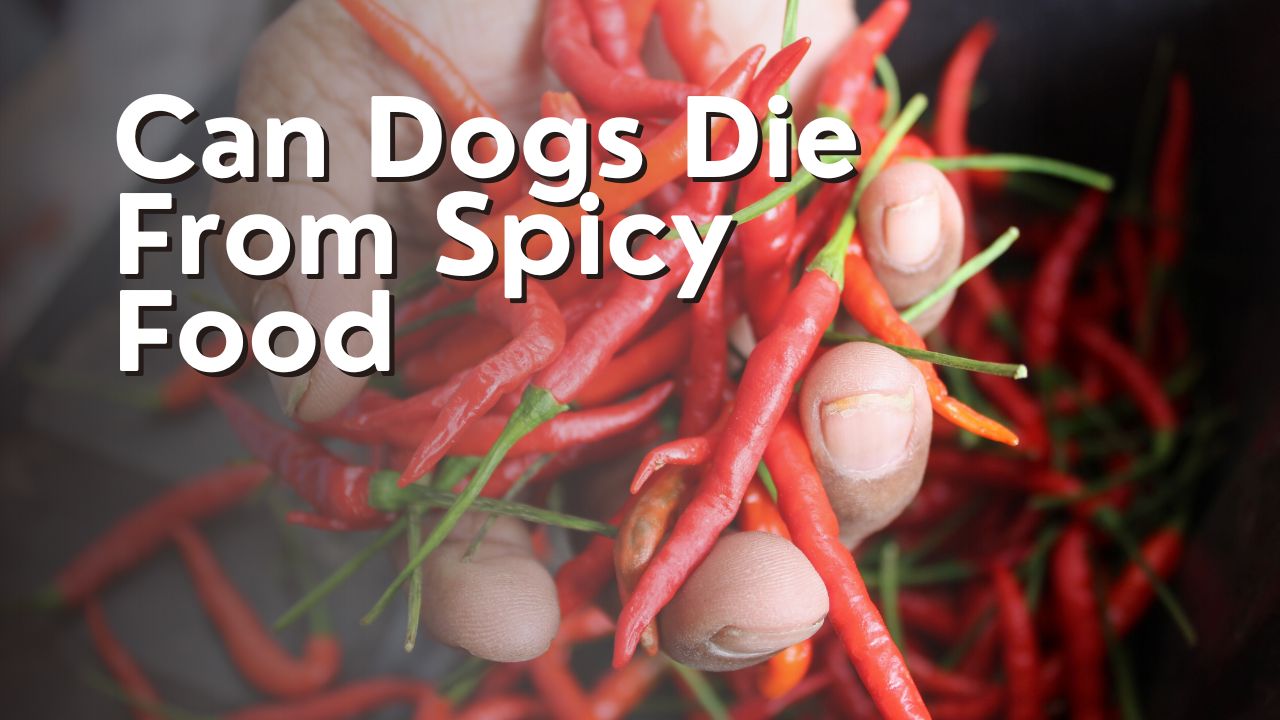In this article, I will explore the question, ‘Can dogs die from spicy food?’
Many dog owners enjoy sharing their favorite spicy dishes with their furry companions, but it’s important to understand the potential risks involved. Dogs have a different digestive system than humans, and certain spices can be harmful to them.
We will discuss the common spices and ingredients to avoid, the symptoms of spicy food poisoning in dogs, and what to do if your dog consumes something spicy.
Let’s dive in and ensure the well-being of our four-legged friends.
- Understanding a Dog's Digestive System
- The Potential Risks of Spicy Food for Dogs
- Common Spices and Ingredients to Avoid
- Symptoms of Spicy Food Poisoning in Dogs
- What to Do If Your Dog Consumes Spicy Food
- Prevention and Precautions
- Signs of a Healthy Diet for Dogs
- Consulting with a Veterinarian
- Training and Conditioning a Dog's Taste Buds
- Conclusion and Final Thoughts
- Frequently Asked Questions
- Conclusion
Understanding a Dog’s Digestive System
Understanding a dog’s digestive system is crucial in determining whether they can die from spicy food. Dogs have a shorter digestive tract compared to humans, which means that food moves through their system more quickly. This shorter digestive tract is designed for processing and digesting raw meat, bones, and other natural foods that dogs would have eaten in the wild.
When it comes to spicy food, dogs may have a different reaction compared to humans. While some dogs may tolerate small amounts of spice, others can have adverse reactions. Spicy food can irritate a dog’s stomach and intestines, leading to gastrointestinal upset, vomiting, or diarrhea. In severe cases, it could even cause pancreatitis, a condition that can be life-threatening.
Additionally, certain ingredients commonly found in spicy food, such as onions, garlic, and chili peppers, can be toxic to dogs. These ingredients can cause damage to a dog’s red blood cells, leading to anemia or other serious health issues.
Ultimately, it is essential to avoid feeding dogs spicy food or any human food that contains potentially harmful ingredients. It is always best to stick to a balanced and appropriate diet specifically formulated for dogs to ensure their overall health and well-being.

The Potential Risks of Spicy Food for Dogs
There can be potential risks for canines when consuming spicy meals. Dogs have a much more sensitive digestive system compared to humans, and spicy foods can cause a range of health issues for them.
One of the main risks of feeding spicy food to dogs is gastrointestinal upset. Spices like chili peppers contain a compound called capsaicin, which can irritate the lining of a dog’s stomach and intestines. This can lead to symptoms such as vomiting, diarrhea, and abdominal pain. In severe cases, it can even cause inflammation or ulcers in the digestive tract.
Another risk is that some spices and seasonings commonly found in spicy foods can be toxic to dogs. For example, onions and garlic, which are often used in spicy dishes, contain compounds that can damage a dog’s red blood cells and lead to anemia. Other spices, such as cumin or paprika, may also have adverse effects on a dog’s health.
To keep my dog safe, I make sure to avoid feeding him anything spicy. Instead, I stick to a balanced and appropriate diet specifically designed for dogs. It’s better to be safe than sorry when it comes to their health and well-being.
Common Spices and Ingredients to Avoid
Avoid using certain common spices and ingredients in your furry friend’s meals to ensure their health and well-being. When it comes to spicy food, dogs have a different tolerance level than humans. Some common spices and ingredients can be harmful to dogs and should be avoided altogether.
Here are five items to keep away from your canine companion’s diet:
- Garlic: While it adds flavor to our meals, garlic contains compounds that can cause damage to a dog’s red blood cells, leading to anemia.
- Onions: Similar to garlic, onions can also cause anemia in dogs. They contain compounds that can damage red blood cells and lead to weakness and lethargy.
- Chili peppers: The spicy heat of chili peppers can cause stomach upset and irritation in dogs. It may lead to vomiting, diarrhea, and discomfort.
- Nutmeg: This common spice, often found in holiday treats, can be toxic to dogs. It can cause hallucinations, tremors, and even seizures.
- Cinnamon: While a small amount of cinnamon is generally safe for dogs, large quantities can cause digestive issues, liver problems, and even low blood sugar.
By avoiding these common spices and ingredients, you can ensure that your furry friend stays happy and healthy.
Always consult with your veterinarian before introducing any new food or spice into your dog’s diet to ensure their safety.
Symptoms of Spicy Food Poisoning in Dogs
If your furry friend consumes spicy ingredients, it’s important to recognize the symptoms of poisoning. Dogs can have adverse reactions to spicy food, just like humans. Some common symptoms of spicy food poisoning in dogs include gastrointestinal upset, such as vomiting and diarrhea. These symptoms can be accompanied by excessive salivation, panting, and restlessness. Your dog may also exhibit signs of discomfort, such as abdominal pain or bloating. In more severe cases, dogs may experience difficulty breathing, weakness, or even collapse.
It’s crucial to monitor your dog closely if you suspect they have ingested spicy food. Keep an eye out for any changes in behavior or physical symptoms. If you notice any of these symptoms, it’s essential to seek veterinary care immediately. The veterinarian will be able to assess the severity of the situation and provide appropriate treatment.
Prevention is key when it comes to keeping your dog safe from spicy food poisoning. Avoid feeding your dog any spicy ingredients, such as chili peppers, hot sauce, or foods seasoned with spices like garlic or onion. Additionally, make sure to store all spices and ingredients securely to prevent accidental ingestion.
By being vigilant and aware of the symptoms of spicy food poisoning in dogs, you can help keep your furry friend safe and healthy.
What to Do If Your Dog Consumes Spicy Food
Make sure you take immediate action if your pup eats something spicy. It’s important to act quickly to minimize any potential harm to your dog. Here’s what you should do if your dog consumes spicy food:
- Stay calm: Panicking will only make the situation worse. Take a deep breath and focus on helping your dog.
- Assess the situation: Determine how much spicy food your dog has consumed and what type of spice was involved. This information will be helpful for your vet.
- Contact your veterinarian: Call your vet and explain the situation. They will provide guidance on what steps to take next.
- Offer water: Spicy food can cause discomfort for your dog. Provide them with fresh water to help soothe their mouth.
- Monitor your dog: Keep a close eye on your furry friend for any signs of distress or discomfort. Look out for symptoms like vomiting, diarrhea, or excessive drooling.
- Follow your vet’s advice: Your vet may recommend bringing your dog in for an examination or suggest home remedies to alleviate any symptoms.
- Prevent future incidents: Take precautions to keep spicy foods out of your dog’s reach to avoid similar incidents in the future.
Remember, it’s always better to be safe than sorry when it comes to your dog’s health.
Prevention and Precautions
To prevent my dog from consuming spicy food, there are a few key points I always keep in mind.
First, I make sure to keep spicy foods out of reach and stored securely, so my dog can’t accidentally get to them.
Second, I educate my guests and family members about the dangers of spicy food for dogs, so they know not to share any with them.
Lastly, I offer safe and healthy alternatives for my dog to enjoy, so they don’t feel left out when I’m enjoying something spicy.
Keep Spicy Foods Out of Reach
Keep spicy foods out of reach so your dog doesn’t get sick or potentially die. Dogs are curious creatures and may try to sneak a bite of your spicy food if given the chance. However, spicy foods can cause a range of health issues for dogs, including stomach upset, diarrhea, and even more serious conditions like pancreatitis.
To ensure your dog’s safety, follow these precautions:
- Store spicy foods in closed cabinets or high shelves where your dog can’t access them.
- Be mindful of where you eat spicy foods, as your dog may try to snatch a bite from your plate.
- Avoid feeding your dog any spicy foods intentionally, as it can be harmful to their digestive system.
- If you suspect your dog has ingested spicy food or is showing signs of discomfort, contact your veterinarian immediately.
By taking these simple steps, you can prevent your dog from getting sick and keep them safe from the dangers of spicy foods.
Educate Guests and Family Members
Inform your guests and family members about the potential risks of feeding certain items to your furry friend. It’s important to educate them about the harm that spicy foods can cause to dogs.
Many people may not realize that dogs have a different digestive system than humans and certain foods that are safe for us can be toxic to them. Spicy foods, in particular, can cause stomach upset, diarrhea, and even more serious conditions like pancreatitis.
Make sure to let your loved ones know that it’s best to avoid sharing spicy dishes with your dog, no matter how much they beg or seem interested.
By educating everyone in your household, you can help ensure that your dog stays safe and healthy.
Offer Safe and Healthy Alternatives
One way to ensure your furry friend’s well-being is by providing them with safe and healthy alternatives to indulge in. While it may be tempting to share spicy food with your dog, it’s important to remember that certain spices can be harmful to their digestive system. Instead, opt for dog-friendly treats and snacks that are specifically made with their dietary needs in mind.
There are many options available, such as natural and organic dog treats that are free from harmful ingredients. Additionally, you can offer your dog fruits and vegetables that are safe for them to eat, like carrots or apples. By offering these safe and healthy alternatives, you can keep your dog happy and satisfied without putting their health at risk.
Signs of a Healthy Diet for Dogs
A healthy diet for dogs includes signs of proper nutrition. It is important to ensure that your furry friend is getting all the essential nutrients they need to thrive. Here are some signs that indicate your dog is on a healthy diet:
- Shiny and soft coat: A well-balanced diet contributes to a glossy and lustrous coat. If your dog’s fur is dull or dry, it could be a sign of nutrient deficiencies.
- Strong immune system: Adequate nutrition supports a robust immune system, helping your dog fight off diseases and infections. If your dog rarely falls ill and has good overall health, it’s a positive indication of a healthy diet.
- Ideal weight: Maintaining a healthy weight is crucial for dogs’ overall well-being. A balanced diet, along with regular exercise, can help prevent obesity, which is linked to various health problems.
By observing these signs, you can ensure that your dog is receiving the right nutrients and enjoying a healthy diet.
Remember, consulting with a veterinarian is always a good idea to tailor your dog’s diet to their specific needs. Providing them with a nutritious and balanced diet will contribute to their overall happiness and longevity.
Consulting with a Veterinarian
It’s important to consult with a veterinarian when it comes to your furry friend’s diet. A veterinarian is the best person to provide guidance on what is safe and healthy for your dog to eat. They have the knowledge and expertise to assess your dog’s specific needs and make recommendations tailored to them.
When consulting with a veterinarian, it’s important to discuss your dog’s current diet and any concerns or questions you may have. They can help you determine if your dog is receiving all the necessary nutrients and if any adjustments need to be made. They may also provide advice on portion sizes and feeding schedules.
Additionally, a veterinarian can address any specific dietary requirements or restrictions your dog may have. For example, if your dog has allergies or sensitivities, they can recommend suitable alternatives or specialized diets. They can also provide guidance on introducing new foods or treats into your dog’s diet.
Overall, consulting with a veterinarian is crucial for ensuring your dog’s diet is balanced and appropriate for their health and well-being. They can provide valuable insights and recommendations to help you make informed decisions about what to feed your furry friend.

Training and Conditioning a Dog’s Taste Buds
After consulting with a veterinarian about whether dogs can die from spicy food, I learned that while it may not be immediately life-threatening, it can still cause discomfort and health issues for our furry friends. However, there are ways to train and condition a dog’s taste buds to enjoy milder flavors and avoid spicy foods altogether.
As a dog owner, I wanted to find a solution to prevent my beloved pet from experiencing any discomfort from spicy food. I discovered that by gradually introducing mild flavors into their diet, I could help them develop a taste for healthier and safer options. This training process involves patience and consistency, but it can lead to a happier and healthier dog.
To demonstrate the effectiveness of this training method, I’ve created a table that showcases a step-by-step approach to conditioning a dog’s taste buds:
| Week | Flavor Profile | Meals |
|---|---|---|
| 1 | Plain | 3 |
| 2 | Mild | 3 |
| 3 | Mild | 2 |
| 4 | Mild | 1 |
By gradually reducing the plain meals and increasing the mild ones, dogs can slowly adapt to new flavors without any adverse reactions. This method helps them develop a preference for milder options and ultimately avoids any potential harm caused by spicy food.
Conclusion and Final Thoughts
To wrap things up, remember to gradually introduce milder flavors into your dog’s diet to ensure their taste buds adapt and avoid any potential discomfort or health issues. Training and conditioning a dog’s taste buds is an essential part of their overall well-being.
Just like humans, dogs can develop a preference for certain flavors and become accustomed to a specific type of food. By gradually introducing new flavors and spices into their diet, you can expand their palate and prevent them from becoming picky eaters.
It is important to note that while dogs can tolerate some level of spice, it is best to avoid feeding them excessively spicy food. Spices like chili powder, hot sauce, or cayenne pepper can cause discomfort and even irritation in their digestive system. This can lead to symptoms such as vomiting, diarrhea, or abdominal pain. In severe cases, it could potentially lead to more serious health issues.
Ultimately, it is crucial to always prioritize your dog’s health and well-being. If you notice any adverse reactions or discomfort after feeding them spicy food, it is best to consult with your veterinarian. They can provide further guidance on what is safe and appropriate for your dog’s diet.
Remember, a well-balanced and gradual introduction of new flavors is key to keeping your furry friend happy and healthy.
Frequently Asked Questions
Can dogs eat any spicy food?
Yes, dogs can eat some spicy food in moderation. However, it’s important to avoid extremely spicy foods as they can cause digestive upset and discomfort for your furry friend.
How quickly can symptoms of spicy food poisoning in dogs appear?
Symptoms of spicy food poisoning in dogs can appear within a few hours. These may include diarrhea, vomiting, excessive drooling, and abdominal pain. It’s important to seek veterinary care promptly if your dog shows any signs of distress.
Can small amounts of spicy food be harmful to dogs?
Yes, small amounts of spicy food can be harmful to dogs. It can cause digestive issues like upset stomach, diarrhea, and vomiting. However, it is unlikely to be fatal unless consumed in large quantities.
Are there any spices that are safe for dogs to consume?
Yes, some spices can be safe for dogs to consume. However, it’s important to remember that each dog is different, so it’s best to consult with a veterinarian before introducing any new spices into their diet.
What are the long-term effects of feeding spicy food to dogs?
Feeding spicy food to dogs can have long-term effects on their health. It may lead to stomach irritation, digestive issues, and potential damage to their taste buds.
Conclusion
In conclusion, it’s important to remember that dogs should not consume spicy food. Their digestive systems aren’t designed to handle the heat and spice that we humans can tolerate.
Spicy food can cause a range of symptoms in dogs, from stomach upset to more serious health issues. It’s crucial for dog owners to be aware of the common spices and ingredients that are harmful to dogs. They should always consult with a veterinarian if their dog consumes spicy food.
By prioritizing their health and well-being, we can ensure that our furry friends live long and happy lives.


